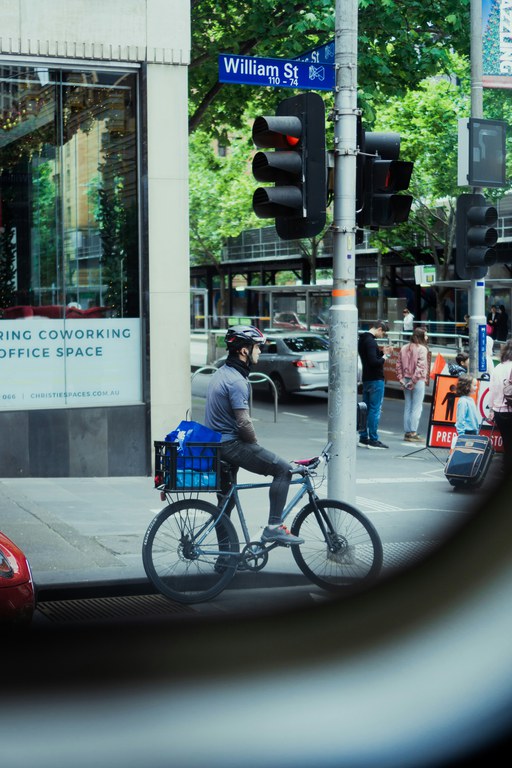This blog was written by one of the students who joined the WageIndicator Gig team during their Internship Programme. The internship also allows the interns to contribute to the news collection and create visuals to give an overview of different platform economy topics.
Author: Daniel Burcea - Bucharest University of Economic Studies Romania Interns
What is the impact of deactivation on gig workers?
When a platform worker is deactivated, they lose the ability to use the application to earn temporarily or permanently. Platforms typically use deactivation as a result of alleged policy violations by workers, customer complaints, performance issues, or suspected fraudulent activity.
Steve McDougall is an e-bike delivery driver from Massachusetts who worked for Uber Eats and DoorDash, and whose story was recently told by the New York Times.
When Uber told him his account had been deactivated for "fraudulent activity" without further explanation, he was left with the DoorDash earnings. This had a serious impact not only on him, but also on his family’s life, because his income dropped from $900 to $500 in a good week.
With his previous money he could:
- Take care of his 15-year-old daughter and two parents with disabilities
- Pay rent
- Pay $100 in child support for his daughter who lives with her mother
- Help with another daughter’s expenses.
At the same time, an increase in his monthly rent forced him to negotiate lower payments on his credit cards and a temporary pause in his child support payments.
Delivering for two apps allowed Mr McDougall to be strategic and earn all the money he needed for his family. After being deactivated, he found himself working overtime to earn just 70% of his previous income.
The appeal process took several months, although an Uber spokesperson claimed that 99% of appeals are resolved within three days. Fortunately, McDougall's case was reviewed and he is now back to work for Uber Eats.
Is this an isolated case for app-based workers? Not at all
Steve’s story is not an exception. According to a 2023 survey of 900 current app-based drivers, 40% of drivers said they had been deactivated by their rideshare companies in the previous year, while 56 percent said they had been threatened with deactivation in the previous year.
And this is also linked to safety: most of them accepted rides even though they felt unsafe because they were scared of the consequences: negative reviews can lead to deactivation.
That's why, when asked what was the safety measure they would appreciate the most, they said 'Ability to deny/cancel rides without consequences drivers feel threatened'.
A researcher at the University of Washington states that deactivations put drivers in extremely stressful situations like:
- losing the lease on their car
- wrecking their credit
- being evicted from the house or the apartment that they’re renting
Another story comes from Amie Campbell, a 55-years-old Lyft driver who used to work in the modelling and fashion industry and as a certified nurse assistant. Being diagnosed with endometriosis, a painful uterine disease, put her in the situation of having to stay away from jobs with a fixed schedule.
In October, last year, she was locked out of her Lyft account after being reported by a customer for driving while using her phone. The company representative who informed her about this did not say when or how exactly Amie had been using the phone. Ms. Campbell explained that she always keeps her phone in a dash-mounted holder while driving. She communicated her frustration to the company, believing that the customer could just want their $8 back for the ride.
A Lyft spokeswoman asserted that the company “investigates safety reports through correspondence with drivers and riders, third-party statements, route data, timing details and police reports.”
To stabilise her income, Ms. Campbell chose to work for Uber instead.
Similar to the stories above, Keegan Lee, a DoorDash driver, had his account deactivated last May due to a failed facial recognition test on his phone, a measure that the company implemented to prevent account sharing. With only Uber Eats to rely on, his earnings dropped from $350 a week to $225.
He had no choice but to borrow money from friends and family in order to afford accommodation at budget hotels, and eventually moved in with his father.
It took 3 months for Lee's appeal to be approved.. He states that “It’s insane and cruel to just falsely take away somebody’s ability to feed themselves under false pretences”.
In an ever-changing and challenging economic environment, where many people in the US turn to gig work to help cover the cost of living in the country, a major problem arises when these workers are frequently faced with unfair account deactivations, often with little explanation and limited recourse.
Where are the workers from other countries standing up against the deactivation?
WageIndicator’s gig database indicates that besides the US, deactivations are experienced and constitute a problem in many other countries.
To name but a few, Italian Stuart workers have recently spoken out against unfair dismissal, as have Uber Eats drivers in Brussels who were prevented from working without prior warning or explanation.
The struggles of New York City's ride-hailing workers themselves go back to September, when they marched on New York City Hall to demand that Uber stop locking them out of the app in the middle of their shifts, or last May, when Uber drivers protested against deactivation in Chicago.
As we've seen, deactivation has a psychological impact as well as a financial one, which is why workers and advocacy groups have launched petitions and initiatives to raise awareness of the issue.

Are there laws against unfair dismissal?
At the beginning of this year, the Seattle Times reported on the implementation of a new law regulating the deactivation of app-based gig worker accounts.
Delivery companies are required by law to make it clear to workers why their accounts have been suspended and how they can appeal.
Drivers cannot be deactivated for the following reasons:
- Not driving enough hours;
- Falling below a minimum customer rating;
- Refusal of a fare offer;
- The results of a background or driving record check (except in egregious circumstances).
The law also requires:
- Companies to conduct a “fair and objective” investigation;
- Companies to give '14 days’ notice before deactivating a driver (except in certain circumstances);
- Drivers to be given a record of the reasons for their suspension and the opportunity to challenge the decision;
- Companies to share internal data on the frequency and reasons for indefinite suspensions of drivers from their platforms.
In 2021, the City of Seattle implemented the Deactivation Rights Ordinance, effective until 31 December 2022, to improve the workplace rights of Transportation Network Company (TNC) drivers. This legislation was the first in the US to give these workers the right to legally challenge deactivation through an arbitration process. Its funding helped create a Driver Resolution Centre (DRC) to provide information, support, and legal representation to Seattle's drivers.
A 2023 research study conducted by the University of Washington, which analysed the impact of the legislation and the establishment above, states that:
- 80% of drivers had their deactivations overturned when qualifying for representation;
- Over half of all driver deactivations are for minor issues such as submitting a scanned copy of a document instead of the original.
- Drivers of colour are reactivated at a higher rate than their peers, which the researchers conclude reflects a racial bias.
- The median time to reactivation shortened from 11 weeks to 41 days once a driver’s case is represented by the DRC. Drivers now spend significantly less time out of work. Deactivated drivers experience severe financial and emotional harm, most acutely drivers of colour and those who don’t speak English as their first language.
Critics, however, point to some limitations of the Seattle ordinance, such as its application to drivers delivering food and groceries, but not to drivers transporting passengers. The latter are covered by a Washington state law passed in 2023.
At the same time, in Australia, the Fair Work Digital Labour Platform Deactivation Code (the Code), which came into force in February 2025, introduces new protections for participants in the gig economy and sets out minimum procedural requirements that platforms must follow before deactivating workers, such as:
- Advance warnings that give workers an opportunity to respond
- A fair process for disputes, where workers can ask for a review and provide evidence.
- Clear and written communication of the reasons for deactivation
It only applies to workers who have regularly performed work through a digital labour platform for at least six months, and who consistently rely on platforms to earn a living.
What are worker groups and unions doing to help gig workers?
To address the major issue of account deactivation, several unions and worker groups in the US have mobilised to fight for solutions.
In June 2024, members of Colorado Independent Drivers United in Denver, Colorado scored a double victory when Colorado Governor Jared Polis signed HB24-1129 and SB24-75 into law. The bills require:
- Transparency between companies like Uber, Lyft and DoorDash and their workers;
- The creation of a driver resource centre;
- Protect both delivery and transportation drivers from deactivation, which is tantamount to termination but can be fully controlled by artificial intelligence without human oversight.
As mentioned above, in early September 2024, the New York Taxi Workers Alliance (NYTWA) marched to City Hall, and demanded regulatory action to curb the lockout that had prevented many drivers from accessing ride-sharing apps and, in turn, earning a living. The union alleges that the city and the two ride-sharing giants (Uber & Lyft) illegally colluded to broker a "backroom" deal aimed at reducing and ultimately eliminating the lockouts. NYTWA says the deal is inadequate and violates antitrust laws.
In April, Justice for App Workers held a delivery worker rally in Elmhurst, New York, to demand fair wages and an end to unfair app restrictions. Members of the group testified that they are tired of unfairly low wages and being locked out of apps when they need to work to afford a basic, decent living.
What conclusions can be drawn from this?
- Account deactivations are a very common problem among app-based gig workers. They are indefinite suspensions from work that are very sudden and poorly justified by the hiring companies. The impact of this issue on workers is reported to be intense, both financially and emotionally, as they're essentially blocked from earning a living.
- Workers are coming together to fight this phenomenon by organising protests, rallies and strikes. They are also demanding legal protection from their state legislators and representatives by pushing for new laws.
- Companies should implement a warning system that allows gig workers to be notified of their policy violations weeks in advance, before they are ultimately terminated.
- The complaints that companies have against their workers should be reasonable and coherently described.
- Companies need to understand that their workers are often overworked and underpaid. They need to implement a decent minimum wage and offer their workers a range of workplace protections, such as paid sick leave or other health and safety regulations to prevent them from engaging in dangerous behaviour to meet tight deadlines and avoid deactivation.
For more insights into the real lives of gig workers, check out Gigpedia's blog section.

